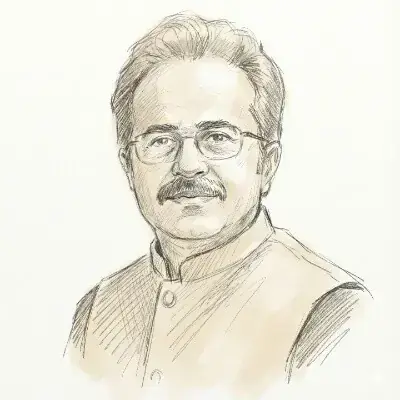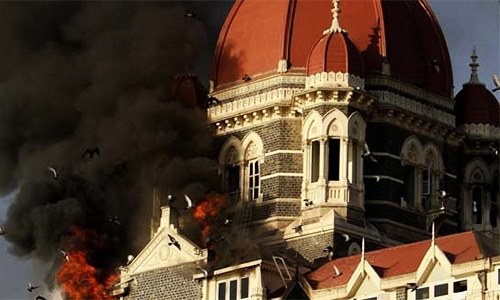ISLAMABAD: As the government sets up a joint investigation team (JIT) to probe any possible Pakistani link in the recent attack on India’s Pathankot airbase, attention is also focused on the Mumbai case, which was also preceded by a similar JIT.
After the 2008 Mumbai attacks, the Indian government blamed Pakistan for the attack. The PPP government at the time had constituted a JIT to probe any possible local links. On the basis of the JIT’s investigation report, the Federal Investigation Agency (FIA) in February 2009 registered a case against Zakiur Rehman Lakhvi, the alleged mastermind, and six other suspects for sponsoring, planning and abetting in the attacks.
Lakhvi was arrested by FIA the same month on the basis of the confessional statement of the lone surviving attacker, Ajmal Kasab, and was detained at Adiala Jail.
Six years later in 2014, he was given bail by an anti-terrorism court judge. However, he is still incarcerated under the Maintenance of Public Order ordinance.
According to the charge-sheet issued on November 25, 2009, Lakhvi, a resident of Okara, was the alleged commander of the outlawed Lashkar-i-Taiba (LT), as well as the mastermind of the Mumbai attacks.
It was further alleged that Lakhvi received training from different centres and then trained other LeT militants, including those who carried out the attacks between November 26 and 28, 2008, killing 166 people.
He was released on bail due to ‘weak evidence’, an FIR that invoked irrelevant sections, a ‘never-ending’ trial and hearsay evidence, say those who followed the trial closely.
Lakhvi’s good fortune
The prosecution in the Mumbai attacks case suffered a setback in May 2014 when Mudassir Lakhvi, the headmaster of a government school in Okara where Ajmal Kasab studied, claimed that Kasab was still alive.
The testimony of Mudassir, who was produced as a prosecution witness by the FIA, exposed the poor coordination of the agency. He ended up strengthening the defence’s case; his claim that Kasab was alive allowed the defence to argue that Kasab’s confessional statement provided by India was doubtful and hearsay. The Pakistani side was not allowed to speak to Kasab directly and was only provided the confessional statement he gave to Indian authorities.
Agencies’ ineptitude, lack of cooperation from New Delhi, Islamabad’s unwillingness all blamed for sluggish pace of Mumbai attacks case
The FIA also produced some other witnesses who had no ‘direct’ knowledge of the attacks in Mumbai and just narrated the story of the incident and tried to establish the link of the accused persons with the Mumbai attacks.
Such complications are also said to have caused an “unprecedented delay” in the trial – one example of this is the fact that only 65 out of 156 witnesses have been examined so far.
Behind the delay
Discussions with Pakistani legal experts and those who keep an eye on India-Pakistan relations revealed that opinions vary on why the trial has dragged on for so long without any resolution.
While some feel that the trial is progressing slowly because it is a complicated case, others blame India for a lack of cooperation. Yet, others feel that Pakistan itself is reluctant to proceed against the facilitators and abettors.
Lakhvi’s defence team is of the opinion that the fault lies across the border.
According to Raja Rizwan Abbasi, the lead counsel for the defence, the place of occurrence was Mumbai, an Indian city, where the Pakistani JIT was not given permission to meet certain officials or examine the relevant evidence there.
“Instead, the Indian government handed dossiers to Pakistan that contained certain information,” he said, adding, “the dossiers could not be produced before the court as evidence; it may be useful in understanding an event but it cannot be treated as tangible evidence.”
He is not the only one to blame New Delhi for the weak case against Lakhvi.
Ahmer Bilal Soofi, an expert on international law, said that since Pakistan was obliged under the UN resolutions to register the FIR against its citizen who had been accused of planning and executing terror attacks, it booked Lakhvi and others in Mumbai attacks case.
“However, the lack of cooperation from the Indian side led to an investigation that was not up to the mark. The Indian government allowed Pakistani lawyers to examine only four witnesses,” he added.
However, not everyone agrees with Abbasi and Soofi.
The special prosecutor in the Mumbai attacks case, Mohammad Azhar Chaudhry, maintains that Pakistani investigators had carried out a credible investigation. “Our investigation into the Mumbai attacks case was far better than the Indian team’s,” he claimed.
“The Indian investigation revolved around the 46-page confessional statement of Ajmal Kasab, whereas our investigators arrested the mastermind and other suspects, traced the financial transactions, identified the company where the engine of the motorboat was purchased, marked out the training camps and so on,” Chaudhry explained.
The case so far
The FIA has so far produced before the court evidence of houses rented by the attackers while they were being trained in different cities, the inflatable boats which were also used during their training; the purchase of the Yamaha engine which the attackers allegedly used in the boat to reach Mumbai as well as determining that boats called Al-Fouz and Al-Hussaini were also used to transport the attackers to India.
The FIA also showed the court that Rs2.1 million was transferred from Saudia Arabia to the Allied Bank Drigh Road Karachi branch in the name of Shahid Jamil Riaz (one of the seven accused in the Mumbai attacks case) to finance the terrorist attacks 13 days prior to the incident.
Intelligence officials testified before the anti terrorism court that the suspects, who allegedly participated in the attacks, were trained at LeT training centres at Yousaf Goth in Karachi, Buttle in Mansehra, Mirpur Sakro in Thatta and in Muzaffarabad.
Pakistan’s responsibility
But not everyone agrees with the argument that the cause of the delay is Indian intransigence.
Veteran journalist Zahid Hussain, who watches Indo-Pak relations closely, says that apart from the lack of cooperation from the Indian side, an ‘un-willing’ Pakistan has also contributed the delay.
If Pakistan was keen on it, the trial could have proceeded far more quickly.
“Though the place of occurrence was an Indian city, it is also an undeniable fact that the attackers were trained and launched from Pakistan,” adding that the Pakistani investigation agencies have plenty of evidence against the accused.
Published in Dawn, January 17th, 2016


































